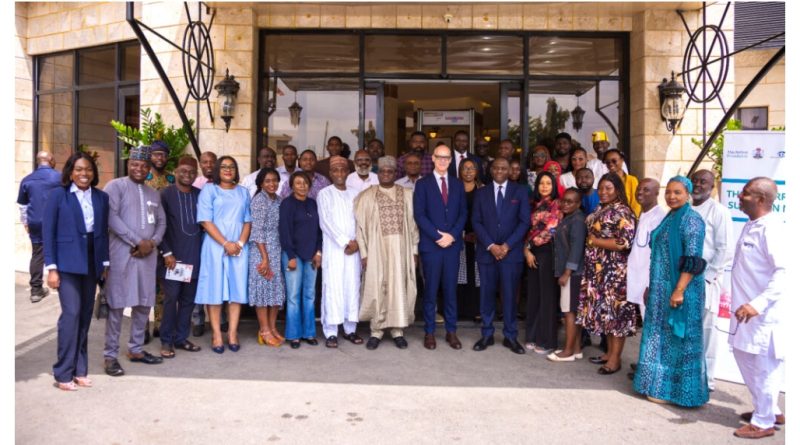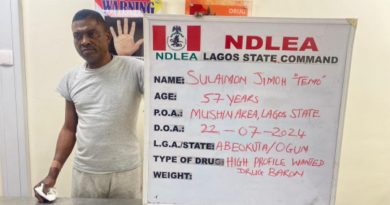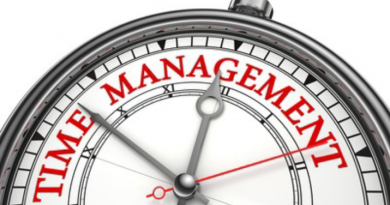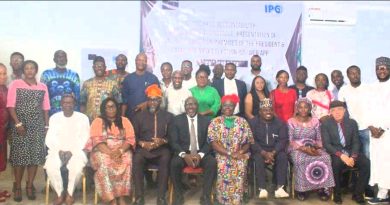NDLEA/ UNODC Train Media Personnel on Anti-corruption, Police Accountability and Sensitization on DPTC
Oru Leonard
In a bid to deepen Media engagement with the Media on drug abuse and wildlife crimes the United Nations Office on Drugs and Crime (UNODC) partnered with the National Drug Law Enforcement Agency (NDLEA), to organize at a two-day media personnel training on anti-corruption, police accountability, wildlife crime and sensitisation on drugs prevention, treatment and care for medial personnel at Abuja, on Tuesday and Wednesday (May 21-22, 2024),
In his Opening remarks, Country Representative in UNODC Nigeria, Dr. Oliver Stolpe called on Nigerian authorities to deal with drug addicts as patients who need treatment, rather than handling them like criminals. Stolpe who disclosed that the UNODC’s mission was to increase public awareness of the distinct differences between drug traffickers and users, said that the two should never be lumped as one. He noted that addiction is a health condition, not a choice.
“The deterrent effect of the death penalty has never been convincingly proven. There is no proof of the effectiveness of the death penalty.
“Our stance as the UN is clear on the death penalty; we are principally and categorically against it. And from a very practical viewpoint, I have to say, it doesn’t make sense”, he emphasised.
Stolpe called for an updated drug data for Nigerians and observed that the current national drug survey for Nigeria was last done six years ago (2018) which does not reflect the current situation for Nigeria.
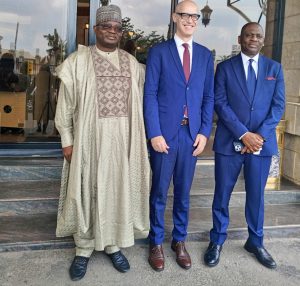
He noted, “The drug use survey of 2018 remains, as far as I can tell, the most cited study in the media. This data is outdated, and I think a very critical question that media could ask at that point is, really, how can we still refer to 2018 data to describe today’s levels of drug use?”
Speaking the Chairman and Chief Executive Officer, National Drug Law Enforcement Agency (NDLEA), Brigadier General Buba Marwa (retired) represented by the Secretary, NDLEA, Shedrach Haruna, said the media remains an indispensable partner in Nigeria’s drug war.
“For us in NDLEA, the media is a valued partner on whom we rely to foster a friendly ecosystem that aids anti-illicit drug abuse and trafficking in society.
“This is a well-thought-out training for media professionals, given that the media is a crucial link between the public and law enforcement and a potent tool for the entrenchment of transparency and accountability in the law enforcement process”, he concluded.
Also Speaking, the Director General of the National Orientation Agency (NOA). Mr. Lanre Issa-Onilu called on citizens to leverage on the Artificial Intelligence and Mobil Technology to improve public outreach and engagement across the country.
He acknowledged the historic challenges faced by NOA to include inadequate resources and logistics constraints that hampered effective public Sensitization efforts across the Local Government Areas, noting that a data base of 45 million contacts of Nigerians is a vast repository for feedback of the citizens mostly youths to the Federal Government.
In a resourceful discussion during his presentation, a consultant with the UNODC noted that people tend to be more sympathetic towards their relatives who are drug abusers than strangers suffering from drug addiction. He therefore advised that all drug users be viewed equally as people in need of rehabilitation.
He implored government agencies to come up with more strategic and effective communication tools to discourage drug use.
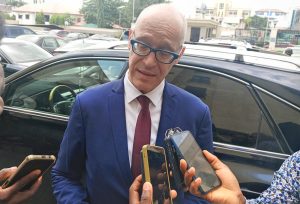
About UNODC
UNODC Country Office Nigeria
2030 Agenda For Sustainable Development:
With the mandate to make the world safer from drugs and crime, UNODC is committed to support Member States in the implementation of the 2030 Agenda for Sustainable Development, which draws together various elements into a comprehensive and forward- looking framework and explicitly recognizes the interrelationship between sustainable development on the one hand, and the fight against drugs and crime, including corruption and terrorism on the other.
The 2030 Agenda reflects a shift in global thinking on how crosscutting issues – including the rule of law and fair, effective and humane justice systems, as well as health-oriented responses to drug use – are enablers for development, and how their absence impedes development in countries of all income levels. The 2030 Agenda, therefore, is a means to ensure that efforts at all levels are holistic and inclusive, backed by multi-stakeholder partnerships and supported by an increase in policy coherence and mainstreaming, and a decrease in addressing crime prevention and drug control issues in silos which are not fully integrated into development plans.
In this sense, the 2030 Agenda does not replace or supersede UNODC’s core mandates, but helps the Office to locate and communicate what it does in the larger context of national and global priorities on sustainable development. UNODC, therefore, provides Member States meaningful support in achieving the Sustainable Development Goals (SDGs) through the application of a results-based approach in project and programme management.

